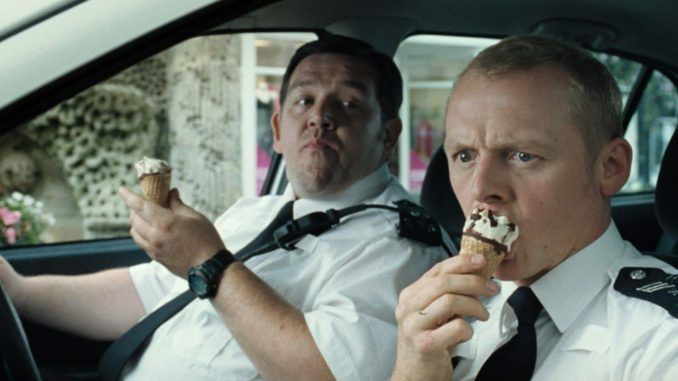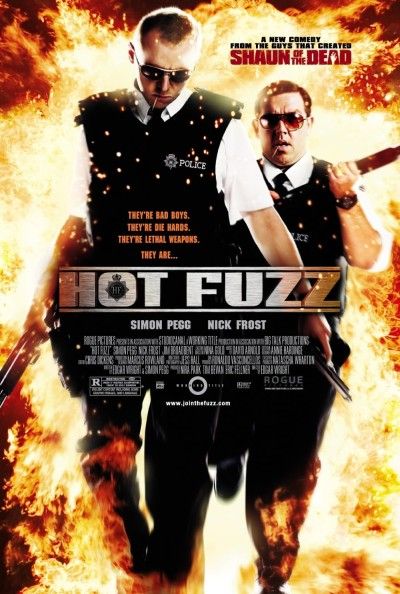
Rating: B
Dir: Edgar Wright
Star: Simon Pegg, Nick Frost, Jim Broadbent, Timothy Dalton
Having nailed perfectly the horror-comedy, skewering the genre with obvious appreciation, for his follow up Wright went back to the same well for a different genre. This time, the target is action movies and, rewatching this, I feel more or less the same as I did on its original release. While a solid effort, this doesn’t manage to pull off the combination to such staggering effect as Shaun. There are certainly better action comedies out there: Stephen Chow’s filmography includes a few, most obviously Kung Fu Hustle. Maybe we just have different tastes in action: Point Break and Bad Boys II are touted here, both of which are likely better works than this.
Another issue could be Simon Pegg’s character, Sergeant Nicholas Angel. To be blunt, he’s an asshole: while unquestionably deliberate, you start from a different place than for Shaun, with whom it was easy to empathize immediately. Angel has admirable qualities, certainly. He just is not very likable, and that leaves the film running uphill from the start. What it does nail is a superb array of supporting characters, who are delightfully memorable. There are two Oscar winners present here: Olivia Colman is the only policewoman in Sandford, and Nicholas’s ex-girlfriend – yeah, Pegg’s character has been broken up with here too – is played, behind a bio-hazard mark, by an uncredited Cate Blanchett.
 Wright also does a very good job of capturing the parochial nature of small-town life. [The bulk of it was filmed in Wells, where he grew up, though they had to remove the city’s cathedral digitally in post-production.] For example, I’ve endured my share of bad amateur dramatic shows, and was wincing throughout the production of Romeo and Juliet performed here. It does feel as if the actual plot at the film’s heart might be too complex, involving various shenanigans around land development. Again, Shaun is elegant in its simplicity. Here, you have to pay attention to the story, and that seems almost to break the rules of the genre.
Wright also does a very good job of capturing the parochial nature of small-town life. [The bulk of it was filmed in Wells, where he grew up, though they had to remove the city’s cathedral digitally in post-production.] For example, I’ve endured my share of bad amateur dramatic shows, and was wincing throughout the production of Romeo and Juliet performed here. It does feel as if the actual plot at the film’s heart might be too complex, involving various shenanigans around land development. Again, Shaun is elegant in its simplicity. Here, you have to pay attention to the story, and that seems almost to break the rules of the genre.
The finale is where the film came closest to losing me. It reverts to an extended series of action set pieces that blurred into one large burst of semi-automatic weaponry, with little to stick in the mind. Fuzz had become the loud, mindless movie, at which it had spent the first hour doing a good job of poking fun, and becomes a lot less effective as a result. The fact the characters have to wave around DVD covers of the movies they’re referencing, and include clips as well, perhaps suggests less confidence in the audience’s ability to get the joke. However, it still became the biggest commercial hit in the Three Cornettos Trilogy (the blue variety here, reflecting the police theme), and it remains a fine piece of work.
